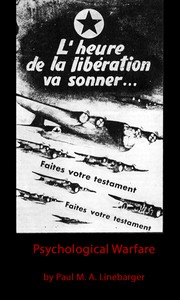|
Paul Myron Anthony Linebarger's (AKA Cordwainer Smith) major work Psychological Warfare now a free download.
 Paul Myron Anthony Linebarger was an important member of the invisible community and went on to become a major sci-fi author too. Paul Myron Anthony Linebarger was an important member of the invisible community and went on to become a major sci-fi author too.
His major non-fiction work has been added to Project Gutenberg and you can download it free from the title link.
Some of his other non-fiction works are here LINK
Wikipedia on Cordwainer Smith
Cordwainer Smith (/ˈkɔːrdweɪnər/ KORD-way-nər)[1] was the pen-name used by American author Paul Myron Anthony Linebarger (July 11, 1913 – August 6, 1966) for his science fiction works. Linebarger was a noted East Asia scholar and expert in psychological warfare. ("Cordwainer" is an archaic word for "a worker in cordwain or cordovan leather; a shoemaker",[2] and a "smith" is "one who works in iron or other metals; esp. a blacksmith or farrier":[2] two kinds of skilled workers with traditional materials.) Linebarger also employed the literary pseudonyms "Carmichael Smith" (for his political thriller Atomsk), "Anthony Bearden" (for his poetry) and "Felix C. Forrest" (for the novels Ria and Carola). He died of a heart attack in 1966 at Johns Hopkins University Medical Center in Baltimore, Maryland, at age 53.
Linebarger was born in Milwaukee, Wisconsin. His father was Paul M. W. Linebarger, a lawyer and political activist with close ties to the leaders of the Chinese revolution of 1911. As a result of those connections, Linebarger's godfather was Sun Yat-sen, considered the father of Chinese nationalism.[3]
While Sun Yat-sen was struggling against contentious warlords in China, Linebarger's father moved his family between a variety of places in Asia, Europe, and the United States and sometimes sent his son to boarding schools for safety; Linebarger attended more than 30 schools. In 1919 at a boarding school in Hawaii he was blinded in his right eye; the vision in his remaining eye was impaired by infection.[3]
Linebarger was familiar with six languages by adulthood. At the age of 23, he received a PhD in Political Science from Johns Hopkins University.[3]
From 1937 to 1946, Linebarger held a faculty appointment at Duke University, where he began producing highly regarded works on Far Eastern affairs.
While retaining his professorship at Duke after the beginning of World War II, Linebarger began serving as a second lieutenant of the United States Army, where he was involved in the creation of the Office of War Information and the Operation Planning and Intelligence Board. He also helped organize the Army's first psychological warfare section. In 1943, he was sent to China to coordinate military intelligence operations. When he later pursued his interest in China, Linebarger became a close confidant of Chiang Kai-shek. By the end of the war, he had risen to the rank of major.
In 1947, Linebarger moved to the Johns Hopkins University's School of Advanced International Studies in Washington, DC, where he served as Professor of Asiatic Studies. He used his experiences in the war to write the book Psychological Warfare (1948), regarded by many in the field as a classic text.
He eventually rose to the rank of colonel in the reserves. He was recalled to advise the British forces in the Malayan Emergency and the U.S. Eighth Army in the Korean War. While he was known to call himself a "visitor to small wars", he refrained from becoming involved in the Vietnam War, but is known to have done work for the Central Intelligence Agency. In 1969 CIA officer Miles Copeland Jr. wrote that Linebarger was "perhaps the leader practitioner of 'black' and 'gray' propaganda in the Western world".[4][5] According to Joseph Burkholder Smith, a former CIA operative, he conducted classes in psychological warfare for CIA agents at his home in Washington under cover of his position at the School of Advanced International Studies.[3] He traveled extensively and became a member of the Foreign Policy Association, and was called upon to advise President John F. Kennedy.
Published non-fiction
1937, The Political Doctrines of Sun Yat-Sen: An Exposition of the San Min Chu I, Baltimore: The Johns Hopkins Press
1938, Government in Republican China, London: McGraw-Hill, ISBN 0-88355-081-4
1941, The China of Chiang K'ai-shek: A Political Study, Boston: World Peace Foundation, ISBN 0-8371-6779-5
1948, Psychological Warfare, Washington: Infantry Journal Press; revised second edition, 1954, New York: Duell, Sloan and Pearce (available online)
1951, Foreign milieux (HBM 200/1), Dept. of Defense, Research and Development Board
1951, Immediate improvement of theater-level psychological warfare in the Far East, Operations Research Office, Johns Hopkins University
1954, Far Eastern Government and Politics: China and Japan (with Djang Chu and Ardath W. Burks), Van Nostrand
1956, "Draft statement of a ten-year China and Indochina policy, 1956–1966", Foreign Policy Research Institute, University of Pennsylvania
1965, Essays on military psychological operations, Special Operations Research Office, American University
Posted by: 3dc 2018-12-12 |


 Paul Myron Anthony Linebarger was an important member of the invisible community and went on to become a major sci-fi author too.
Paul Myron Anthony Linebarger was an important member of the invisible community and went on to become a major sci-fi author too.